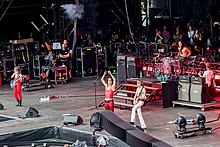History of the Eurovision Song Contest
[84] In the years following the formation of the EBU a number of big events were transmitted via their infrastructure, including the coronation of Elizabeth II, which was broadcast in France, Belgium, the Netherlands, and Germany, in addition to the United Kingdom.[81][83][85] In September 1953, an EBU meeting in London resulted in a series of international exchange programmes organised the following year, entitled the "European Television Season", and relayed live across Europe through the Eurovision network.This committee met in Monte Carlo in January 1955, and approved two new projects for further study: a European song competition, initially proposed by Sergio Pugliese from the Italian broadcaster RAI, and a contest of amateur entertainers; the latter idea was eventually discarded.[83][87][88] A planning sub-group was formed to establish the rules of the competition, headed by Eduard Hass of SRG SSR, which used the Italian Sanremo Music Festival as a basis for their work, with several amendments and additions made to better reflect this new international version.[10][109] Sweden were forced to withdraw due to industrial action by the Swedish Musicians' Union, however as Portugal made its debut appearance the total number of competing countries remained at 16.[114] Some ideas in common among several broadcasters included: the introduction of semi-finals to reduce the number of competing acts, with some also suggesting that competing countries should be split on a geographic or linguistic basis; music experts having a 50% stake in the result to enable more of an emphasis being placed on musical quality; and a tightening of the rules on language and submission cut-off, with the creation of an executive supervisor role in order to oversee the contest and raise production standards.[124][126] As four medals had fortunately been struck for the prize-giving, Spain's Salomé, the UK's Lulu, the Netherlands' Lenny Kuhr and France's Frida Boccara were all able to receive their prize ahead of a reprise of all four winning songs: "Vivo cantando", "Boom Bang-a-Bang", "De troubadour", and "Un jour, un enfant" respectively.After Spain's TVE and Germany's ARD, having come second and third the previous year, and France's ORTF had turned down the opportunity to host, the BBC offered once again to step in, taking the contest outside of London and England for the first time, to the Scottish capital.[134] The contest was broadcast in 28 countries, and for the first time was available live in Asia, with viewers able to watch the show in Japan, Taiwan, the Philippines, Hong Kong and Thailand.[149] The United Kingdom earned its third Eurovision victory, courtesy of Brotherhood of Man and "Save Your Kisses for Me", which would go on to sell over six million records worldwide, more than any other winning song in the history of the contest.[27][162] 20 countries competed in total, with Cyprus making its debut appearance, Israel and Yugoslavia returning, and Morocco and Italy withdrawing, the latter for the first time since the contest was formed.Bucks Fizz, specially formed for the contest, would have great success in the following years, and their Eurovision winning song "Making Your Mind Up" would go on to become a Europe-wide hit.[168][169] Luxembourg recorded its fifth outright win after a close vote over Israel, Sweden and Yugoslavia, with the French singer Corinne Hermès cementing the Grand Duchy as one of the contest's most successful countries with "Si la vie est cadeau".[30][170] 19 countries in total took part, with Ireland returning and Israel declining to participate as the date of the contest clashed with Yom HaZikaron, with Greece also withdrawing at a late stage after broadcaster ERT decided that their potential songs were too low quality for the event.[175] In a landmark event the 500th song to grace the Eurovision stage was performed at this contest, courtesy of Luxembourg's Sherisse Laurence and "L'Amour de ma vie".Since the contest's formation two broadcasters had been responsible for choosing Belgium's entries, with French-language RTBF and Dutch-language Belgische Radio- en Televisieomroep (BRT) alternating every other year.[182] The same group of countries from 1987 entered, however Cyprus was forced to withdraw at a late stage when it was discovered that their entry had previously competed in the Cypriot national selection in 1984.[182] The RTÉ production team made a great effort to modernise the contest and attract a younger audience, with a modern stage commissioned, the largest yet seen, which featured two giant video walls, and the first ever use of a computerised scoreboard.[40][194] It remains the only Irish production of the contest to be held outside of Dublin and, as a small town of only 1,500 people, Millstreet became the smallest Eurovision host to date, although the Green Glens Arena was able to hold up to 8,000 spectators.[40][195] Changes in Europe in the 1990s were first reflected at this contest, with several new countries formed following the dissolution of the Soviet Union and breakup of Yugoslavia wishing to compete for the first time.[44][211] Israel withdrew voluntarily due to the contest conflicting with Yom HaShoah, giving a reprieve to Bosnia and Herzegovina which would have otherwise been relegated; Italy also made a brief return after a four-year absence, in what would be their last entry for fourteen years.[211][212] The first use of televoting was implemented at this contest on a trial basis, with the points from Austria, Switzerland, Germany, Sweden and the United Kingdom being determined by the viewing public rather than an assembled jury.[217] This change, which proved controversial, meant that all entries would be accompanied by a backing track for the first time, a decision which former winner Johnny Logan claimed had turned the contest into "karaoke".[227][229] Turkey gained its first Eurovision win, with Sertab Erener victorious in one of the closest contests ever seen, as "Everyway That I Can" triumphed with only three points separating the top three countries.[258][259] Sweden secured its fifth Eurovision title, represented by Loreen and "Euphoria", which would go on to become a great commercial success following the contest, selling over two million copies worldwide.[61] Artists representing 37 countries competed in Denmark's third contest as host, with Austria emerging as the victor to gain their second victory, their first in 48 years, with Conchita Wurst and "Rise Like a Phoenix".[267] Developments in Russia, particularly the introduction of a gay propaganda law and the annexation of Crimea from Ukraine, were also present in the contest when audible booing could be heard during the Russian entry and voting.[64] 43 countries applied to take part in the contest, however only 42 would subsequently take part in Ukraine's second contest: Russia were unable to compete after Ukrainian authorities banned their selected performer Yuliya Samoylova from entering Ukraine due to illegally entering Crimea in 2015, with proposals for Samoylova to compete via satellite from Russia being rejected by the Russian broadcaster.[315][316] Måneskin's win in the contest marked the band's international breakthrough, with their releases entering numerous European and global weekly charts in the months following their victory.[333] Due to a backstage incident involving its entrant and a production staff member, the Netherlands was disqualified between the second semi-final and the final, but the country retained its right to vote.


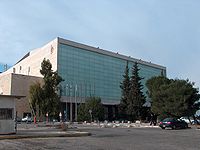











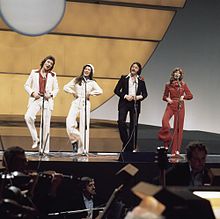




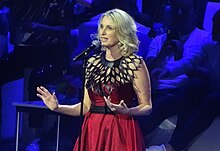
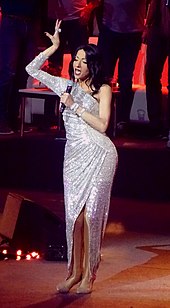






Marcel BezençonEurovision Song ContestFrenchEuropean Broadcasting UnionSergio PuglieseSanremo Music Festival1,717 songs52 countriesrelegationrules of the contestvoting systemlanguage criteriaGuinness World Records2020 editionCOVID-19 pandemicSRG SSRTeatro KursaalLuganoSwitzerlandGroßer Sendesaal des hessischen RundfunksFrankfurtNetherlandsAVRO StudiosHilversumFrancePalais des FestivalsCannesRoyal Festival HallLondonLuxembourgVilla LouvignyLuxembourg CityBBC Television CentreDenmarkTivoli Concert HallCopenhagenSala di Concerto della RAINaplesAustriaViennaUnited KingdomRoyal Albert HallTeatro RealMadridRAI CongrescentrumAmsterdamIrelandGaiety TheatreDublinMonacoUsher HallEdinburghNouveau ThéâtreBrighton DomeBrightonSwedenStockholmsmässanStockholmNederlands CongresgebouwThe HagueWembley Conference CentrePalais des CongrèsIsraelInternational Convention CentreJerusalemHarrogate Convention CentreHarrogateGermanyRudi-Sedlmayer-HalleMunichThéâtre MunicipalScandinaviumGothenburgNorwayGrieghallenBergenBelgiumPalais de CentenaireBrusselsPalais de BeaulieuLausanneYugoslaviaVatroslav Lisinski Concert HallZagrebStudio 15 di CinecittàMalmö IsstadionMalmöGreen Glens ArenaMillstreetPoint TheatreOslo SpektrumNational Indoor ArenaBirminghamGlobe ArenaParken StadiumEstoniaSaku SuurhallTallinnLatviaSkonto HallTurkeyAbdi İpekçi ArenaIstanbulUkrainePalace of SportsGreeceOlympic Indoor HallAthensFinlandHartwall ArenaHelsinkiSerbiaBelgrade ArenaBelgradeRussiaOlimpiyskiy ArenaMoscowTelenor ArenaDüsseldorf ArenaDüsseldorfAzerbaijanBaku Crystal HallMalmö ArenaB&W HallerneWiener StadthalleUA:PBC


